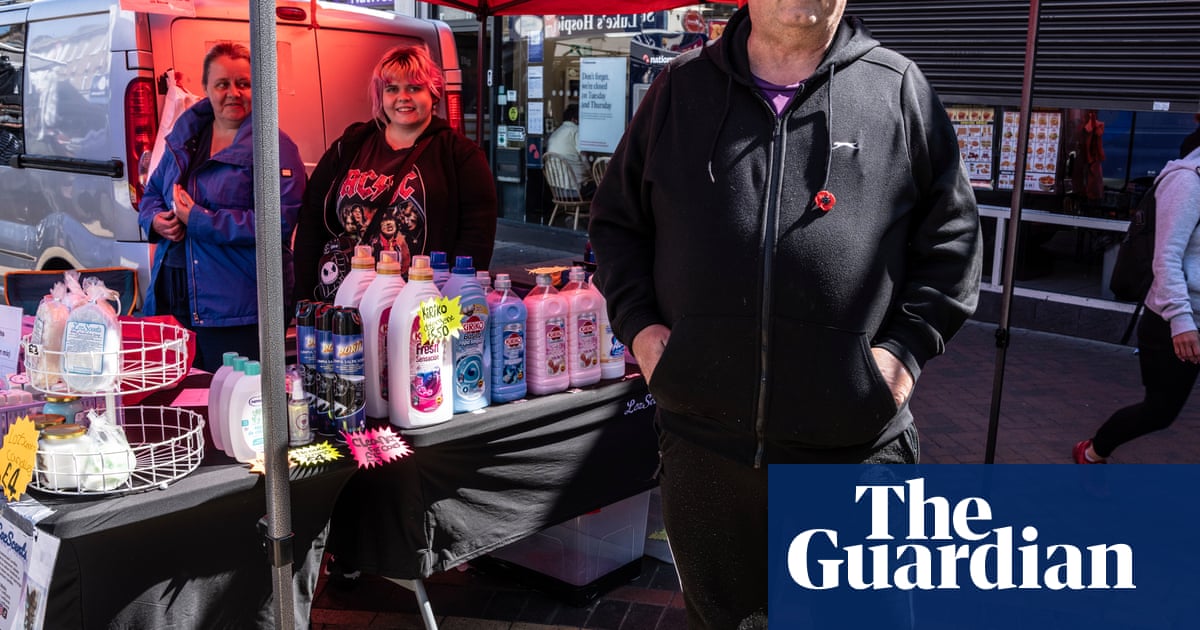When Keir Starmer was asked last week whether he thought Britons had finally moved on from the issue ofBrexit, his answer was a definitive yes.
It’s not difficult to see why the prime minister would hope to settle the question, before a week in which he hopes to reset the UK’s relationship with the EU, clearing a way for easier access to a marketplace that could help increase the economic growth he badly needs.
But at a different kind of marketplace, in one of the most stridently Brexit-backing parts of the country, the answer was not so clearcut.
Gazing up from the display of scented products at his family’s stall on the high street in Grays, Thurrock, Nigel Guest briefly pondered.
“It feels like we never left the EU to be honest,” replied Guest, 56, a lifelong native of theEssexconstituency who, along with an overwhelming 72% of local voters, voted to leave the EU in 2016. Only three other districts backed Brexit to the same extent.
“I just feel that it was a missed opportunity. Yes, people were sometimes fed bullshit. But they were asked if we wanted to come out and people around here literally voted in their droves for it. We’ve never really seen the investment we were promised.”
His partner, Sarah, went further, accusing successive governments of a “betrayal”. Money that she believed had been saved by exiting the EU should have been channelled into improving it and other public services, she said.
Such sentiments were not hard to find behind the bustle of Friday market day in Grays, nestled on the north bank of the Thames, a short drive and even shorter train ride from Tilbury docks, part of the Thames freeport.
In the period before the EU referendum,Thurrock recordedthe lowest levels of life satisfaction of any place in the UK, while hostility towards immigration was tapped into first by the BNP and later Ukip.
With similar messaging, Reform UK is now eyeing its electoral prospects here, where it came second in last year’s general election. But for the postponement of local elections, it could also well have added the Thurrock council – declared in effect bankrupt in 2022 – to the list of those it won on 1 May.
Yet economic green shoots have emerged, not least in Tilbury, where plans were submitted last week to expand the thriving port by as much as 40 hectares (100 acres).
“Thurrock is very much like a red wall seat. It just happens to be in the south rather than the north,” said Jackie Doyle-Price, who was the local Conservative MP from 2010 until last year, when Jen Craft won the seat back forLabour, which had held it for most of the period after the second world war.
“It’s close to London, but Brexit was still an opportunity for those who felt politics was leaving them behind to voice their dissatisfaction,” Doyle-Price said. “People have moved on from the vote in many ways, but one thing which really cut through during the referendum campaign – the immigration debate – has got worse. What was promised hasn’t materialised, because immigration has continued to remain high.”
Those shifts in demographics are vividly illustrated by the changing face of Grays’ high street, where a diverse range of new restaurants, food stores and other retailers have arrived over the past decade.
Those newcomers included Hassan Naeen, who was optimistic about the town’s future since establishing Sabina, a supermarket selling hair and body products to African-Caribbean customers and others.
“There’s a good community here, and we have been promised that regeneration of the town is coming,” he said. As for the question of potential tensions over immigration, he had praise for the government’s plans to toughen policy.
At a west African restaurant next door, there was a candid if careful reflection from Father Paschal Uche as he fetched lunch with a fellow Catholic priest, Tochukwu Okonkwo.
“It shouldn’t be overstated but sometimes you see divides that might be there even within our community. So, there are certain masses that might have more white, older crowds and others where you’ve got mainly west African or a migrant community.”
As for Brexit, he said of his experience working elsewhere in Essex: “I think, speaking personally, that some people might have been hit by the realities, whether that’s about travel, certain conveniences or whatever else, and feel they are still waiting to see the benefits.”
While they wait, however, house prices and rents in the area have been rising to levels beyond the reach of local people, a point emphasised by Neil Woodbridge, whose social enterprise employs 200 staff supporting local disabled people.
“I don’t pick up on a huge amount of regret from my staff who voted Brexit. As with elsewhere, it was an ‘up yours to the government’ and I think they would do it again.
“Keir Starmer might be right to the extent Brexit is in the past for them, but the reality is that they’re struggling. There’s a thing called the ‘Thurrock shrug’, and it’s where people go ‘yeah, whatever’ because they always feel let down by government.
“There are such great opportunities, whether it’s the ports expansion locally or the direction the economy hopefully is going, but people need to be brought along. Otherwise it’s just storing up big problems.”
